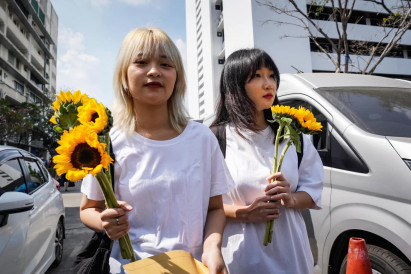Groups express concern about worsening condition of three activist hunger strikers

A network of health workers on Friday called for the unconditional release of all detained political prisoners as they expressed worry over condition of three hunger-striking activists.
The Mor Mai Thon (impatient doctors) group, Nurses Connect, a public health personnel network and related groups submitted a letter to the Supreme Court president, the Bangkok South Criminal Court chief judge, Ratchadaphisek Criminal Court chief judge and a representative of the United Nations in Thailand to call for the restoration of bail rights for detained political activists so that they could have better treatment physically and mentally.
The petitioners attached the names of 339 personnel in multiple medical fields who support the call for the immediate and unconditional release of all detained political activists, together with a list of 500 other supporters.
Many people have been arrested in political cases in recent years, their letter said. Many people have been imprisoned without being granted bail while they await trial, and others have been refused bail while they appeal convictions.
According to Thai Lawyers for Human Rights (TLHR), at least 1,888 people have been prosecuted for political participation and expression since the beginning of the Free Youth protests in July 2020. At least 215 are facing lese majeste (royal defamation) charges and 128 have been charged with sedition.
The medical workers expressed worry about the health condition of three activists — Tantawan “Tawan” Tuatulanon, Orawan “Bam” Phuphong and Sitthichok Sethasavet — who are now in the third week of their hunger strike. Prolonged refusal of food and water would seriously affect the body and mind and this poses a risk of disability or death at any moment, they said.
Even though the three activists are in hospital, they are refusing most medical intervention, according to the letter.
The letter cited health risks such as hypoglycaemia or low blood glucose, electrolyte imbalance due to lack of essential minerals, dehydration, acute kidney injury, ketoacidosis and other serious symptoms due to lack of nutrients for a long time.
Ms Tantawan and Ms Orawan are facing royal defamation charges under Section 112 of the Criminal Court for taking a public poll last year about royal motorcades.
They went to court on Jan 16 to request the revocation of their bail as a gesture of solidarity with other detained colleagues. The two young activists began their hunger strike on Jan 18
They are currently in Thammasat University Hospital, where they have agreed in recent days to take small amounts of water at the urging of doctors.
The hospital said on Friday that Ms Tantawan was suffering from exhaustion, dry mouth, bleeding from the gums and chest pains when lying down. Ms Orawan had similar symptoms and also reported cramps, weakness in the thighs and dizziness.
A lawyer who visited the duo told them that five activists who had been fitted with electronic monitoring devices while out on bail had received court approval to remove them. The two women welcomed the news but insisted that the court must still bail out all of their detained colleagues, the lawyer said.
Mr Sitthichok, also in Thammasat University Hospital, began his hunger strike in Bangkok Remand Prison where he was being held while he appeals a conviction on Jan 17 for lese majeste charge and other charges.
A lawyer who visited Mr Sitthichok on Friday said he had lost about nine kilogrammes and while he was feeling faint and dizzy, he was sleeping better. He continues to refuse food but is sipping water and has agreed to take regular doses of vitamins, the lawyer said.
On Thursday, eight human rights and democracy organisations submitted an open letter to the president of the Supreme Court asking it to release detained political activists and to review court regulations.
Meanwhile, Sorawit Limparangsi, a spokesman for the Court of Justice, said a review by the court showed that the issuance of warrants of detention or granting temporary release were decided by judges without any interference.
The courts used the same guidelines and standards in all cases to ensure that the law was enforced equally and fairly to maintain the rule of law, he said.

